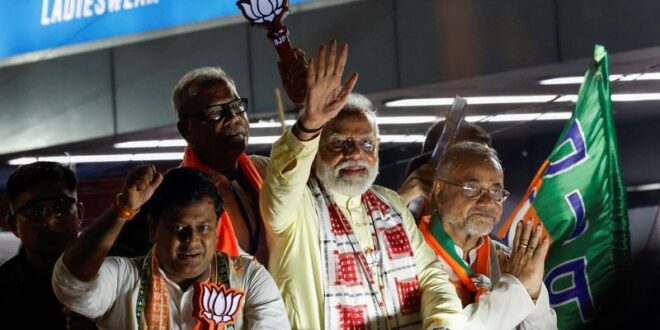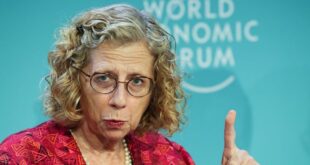NEW DELHI (Reuters) – Indian Prime Minister Narendra Modi is set to win a rare third term in office, but a smaller-than-expected mandate means he will have to lean more on his allies for support, and that means urgently addressing issues like unemployment, inflation and economic disparities in the world’s most populous nation.
Unlike the last two elections, Modi’s Hindu nationalist Bharatiya Janata Party (BJP) will need its alliance partners to cross the 272 majority mark in the 543-seat lower house of parliament, according to the running vote count on Tuesday.
Modi had set a target of more than 400 seats for his National Democratic Alliance (NDA), but it is currently leading in only about 290, according to Election Commission data about three-quarters of the way through the count. The BJP itself was leading in 239 seats, compared with 303 at the last election in 2019.
Final results are expected to come later on Tuesday or early Wednesday.
“The BJP’s reliance on allies to form the government is a slap in the face,” said Milan Vaishnav at the Carnegie Endowment for International Peace think-tank in Washington.
“At this stage, NDA allies will extract their pound of flesh, which will have an impact not just in terms of policymaking but also in terms of the composition of the cabinet. (Earlier) the BJP could dictate terms with very little regard for its coalition partners.”
Modi, a strong leader, has not had to rely on alliance partners in the past and it was not clear how easily he would cope.
“Modi is not known as a consensual figure,” said New Delhi-based political commentator Arathi Jerath. “So, it’ll be very interesting to see how he manages the pulls and pressures of a coalition government.”
Populism and welfare policies will “gain currency” as Modi will have to depend on regional leaders like N. Chandrababu Naidu in the southern state of Andhra Pradesh and Nitish Kumar in Bihar in the east, who support such policies, said political analyst Rasheed Kidwai.
Naidu’s Telugu Desam Party and Kumar’s Janata Dal (United) said they would endorse Modi for prime minister.
Modi called the win for his alliance historic and said that “we will continue the good work done in the last decade to keep fulfilling the aspirations of people”.
The BJP, which had campaigned on India’s spectacular economic expansion, its growing international stature and the party’s Hindu-first agenda, has acknowledged unemployment was a factor in the election.
“Employment is a challenge that we also accept and whatever best can be done is being done,” spokesperson Gopal Krishna Agarwal said.
The unemployment rate in India rose to 8.1% in April from 7.4% in March, according to the private think-tank Centre for Monitoring Indian Economy, compared with around 6% before the COVID-19 pandemic. Modi first came to power in 2014 on the promise of creating 20 million jobs a year, but has fallen far short of that.
Government estimates for the latest January-March quarter show that the urban unemployment rate in the 15-29 age group ticked higher to 17%, from 16.5% in the prior quarter.
Despite India’s impressive economic growth of more than 8%, rural distress has increased as incomes have fallen amid rising food prices.
Such economic growth has meant wealth is concentrated in the richest 1% of India’s population.
While headline inflation hovering around 5% is relatively low, food inflation of above 8% since November 2023 has hit the poor hard. Prices of vegetables and cereals have risen by double digits for most of the last year.
TURNOUT TROUBLE
Modi was seeking one of India’s biggest mandates in the six-week-long election after most opinion polls conducted before voting began had predicted a big victory for him, driven by his personal popularity, free cereal for the poor, new roads and bridges, and his courting of majority Hindus.
But a fall in voter turnout in the first stage of the seven- phase election worried the BJP, several party officials said. A pollster, who declined to be named citing private conversations, said he got calls from “panicked” BJP officials asking if “something was going wrong. Why aren’t people coming?”.
At the same time, some analysts told TV debates that opposition attempts to woo the masses with promises of affirmative action, bigger handouts and more jobs were gaining traction.
That is when Modi changed tack.
Having earlier focused on economic development, India’s image and such issues, he switched back to accusing the opposition of favouring minority Muslims at the cost of Hindus.
“I believe that the polarising campaign that the prime minister ran this time, the kind of, you know, hyped-up media outreach that he did, I think these were all signs that he was worried,” said political commentator Arati Jerath.
The BJP said Modi was their best bet to put their message across.
“We discussed internally how our work, economic development, India’s global image and such things sometimes do not set the narrative,” said spokesperson Agarwal.
“The politics is such that other things dictate the narrative, and the BJP must also respond accordingly. For our narrative to work, the prime minister is the best communicator.”
However, with the BJP falling short of a majority on its own, its promises like a uniform civil code for all religions, opposed by some Muslims, and simultaneous state and national elections, will likely be put on the back burner. They could be replaced by policies aimed at more bread-and-butter issues as its allies could demand.
“Modi has seemingly lost his aura of electoral invincibility,” said Michael Kugelman, director of the Washington-based Wilson Center’s South Asia Institute think tank.
“He remains highly popular, and his party likely would have done even worse if he weren’t leading it. This is a leader who has repeatedly bounced back from political and policy setbacks and retained large public mandates. With the results we’re seeing today, that narrative of resilience has been dealt a big blow.”
(Reporting by Krishna N. Das, Aftab Ahmed, Rupam Jain, Nikunj Ohri, Jatindra Dash, Shivangi Acharya, Saurabh Sharma, Tora Agarwala, and Subrata Nag Choudhury; Editing by Raju Gopalakrishnan)
 BeritaKini.biz Berita Viral Terkini di Malaysia
BeritaKini.biz Berita Viral Terkini di Malaysia





